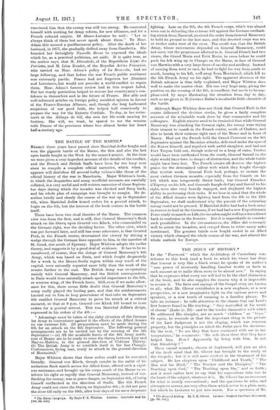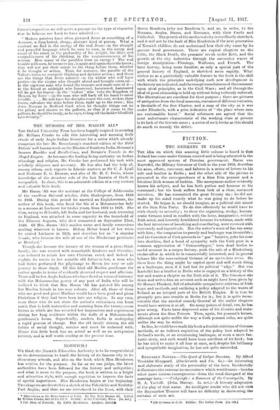THE JESUS OF HISTORY.• Ix the " Foreword " which
the Archbishop of Canterbury con- tributes to this book (and a hook to which his Grace has done that honour is very like a black swan) he speaks of its maimed "rare power of reverently handling familiar truths or (nets in such manner as to make them seem to be almost new." In saying that lie expresses 'what every one will feel to be the chief distinction of the book, and he also supplies the reason why it is impassible to review it. 'The facts and sayings of the Gospel story are known to all what Mr. Clover contributes is a new emphasis, or a new perspective, or a new imaginative light on the various: uetere and speakers, or a new touch of meaning in a familiar phrase. To take an instance : he calls attention to the charm that our Lord's first hearers found in His teaching—" they marvelled at his words
of charm" (Luke iv. 22)—and to the tender live with achich He addressed His disciples, not so 111111:11 " children " as " boy." Or agnin, he reminds us that the important thing in the picture of the Last Judgment is not the staging, nide!' was common
property, but the principles on which the Judge gave hie denim' On the text, "Ye are they that hove continued with mo in ray temptations," he comments: "He tells them there that they have helped him. How 7 Apparently by being with him. is not that fricod.ship 1 "
These casual remarks, chosen at hi-pi:awn], will give an idea of the fresh mind that Mr. Glover has brought to the study of the Gospels ; but it is still more evident in the treatment of M. subject. lie bee chapters upon " Childhood and Youth," " The Man and his Mind," " The Teacher and the Disciples," " The Teaching upon God," " The Teaching upon Sin," and so forth ; and it must suffice here to say that his expositions take one to the heart of the subject, whatever it is. Mr. Clover lion no reverence for what is merely conventional ; and the questions he mks, and attempts to answer, aro very often these which occur to a plain man, but which he hesitates to put into words. For a specimen of Mr.
• The Jaw of iliaory. By S.S. Glover. London: Student Christian Momenta, pa. W. mot.j
Clovot•'aexposit ion we will quote a passage on the type of character that he believes our Lord to have admired :—
" Modern painters have often pictured Jesus as something of a dreamer, a long .haired, sleepy, abstract kind of person. What a contrast we find in the energy of the real Jesus—in the straight and powerful language which ho uses to men, in the sweep and range of his mind, in the profundity of his insight, the drive and compulsiveness of his flunking, in the venturesomeness of his actions. How many of the parables turn on energy I The real trouble with men, he seems to say, is again and again sheer slackness ; they will not pat their minds to the thing before them, whether it be thought or action. Thus, for instance, the parable of the Talents turns on energetic thinking and decisive action; and these are the things that Jesus admires —in the widow who will have justice—in the virgins who thought ahead and brought extra cal- m the vigorous man who found the treasure and made mire of it— in the friend at midnight who hammered, hammered, hammered till he got his loaves—in the 'violent' who 'take the Kingdom of Heaven by force'—in the man who will hack off his hand to enter intolife.. . . He will have his disciples count the cost, reckon their forces, calculate the risks before them, right up to the Moss; like John Bunyan in Bedford Gaol, when lie thought things nut to the pillory and thence to the gallows, so that if it came to the gallows, he should be ready, as he says, to leap off the ladder blindfold into eternity."



























 Previous page
Previous page